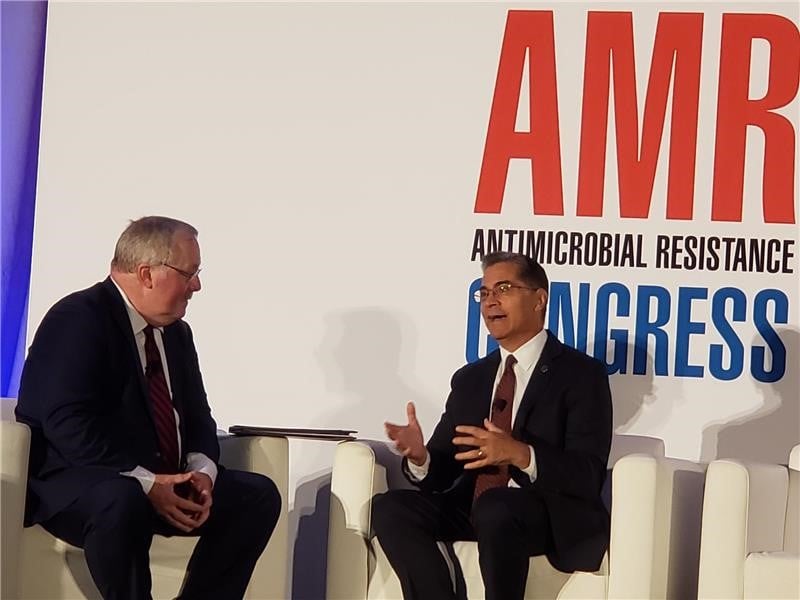 On Sept. 8, I had the distinct privilege of sitting down with U.S. Department of Health and Human Services Secretary Xavier Becerra for a fireside chat at the World Antimicrobial Resistance Congress. The secretary’s passion for solutions to address AMR was evident and a true credit to the many IDSA members who have consistently worked to educate policymakers on the AMR crisis.
On Sept. 8, I had the distinct privilege of sitting down with U.S. Department of Health and Human Services Secretary Xavier Becerra for a fireside chat at the World Antimicrobial Resistance Congress. The secretary’s passion for solutions to address AMR was evident and a true credit to the many IDSA members who have consistently worked to educate policymakers on the AMR crisis.
As all of us on the front lines of COVID-19 and the monkeypox outbreak understand all too well, ID is having “a moment.” Secretary Becerra challenged everyone at the conference to turn this moment into a movement — a movement that will bring forth the policy changes we need to effectively confront AMR and strengthen the ID workforce.
The secretary reflected that the U.S. government has spent trillions of dollars responding to COVID-19, more money than we have spent responding to a single crisis since World War II. COVID-19 has dominated the headlines and shown the public how devastating an infectious disease can be. We need to leverage the attention on COVID-19 to drive a great public outcry for action on AMR.
Secretary Becerra and I discussed three key areas of the AMR response that require significant attention: the antibiotic pipeline, antimicrobial stewardship and the ID workforce (clinical and public health).
As the secretary noted, a president’s budget indicates his values, and President Biden’s budget for 2023 included a proposal for a novel financing approach to revitalize antibiotic R&D — a proposal that would de-link antibiotic revenues from the volume of antibiotics used. This is precisely the approach taken in the PASTEUR Act, a bipartisan bill that IDSA helped develop that continues to gain momentum in Congress.
The PASTEUR Act and the president’s budget both also contain funding to support antimicrobial stewardship. Secretary Becerra noted that his wife, a practicing OB-GYN, told him the most important thing he could mention during our chat was the need to use antibiotics correctly.
A robust ID workforce is central to our efforts to combat AMR, and I was grateful for the opportunity to highlight for the secretary the study that Rochelle Walensky, MD, MPH, FIDSA, and I authored in 2020 which found that nearly 80% of counties in the U.S. do not have a single infectious diseases physician. The secretary agreed that our country must do a better job of recruiting more people into primary care, infectious diseases and public health, particularly from and in underserved communities. He noted that loan repayment may be an important strategy and that broader investments in public health writ large should help.
I was very encouraged to hear the secretary conclude our chat by emphasizing the Administration’s commitment to achieving AMR solutions, and I encourage all IDSA members to heed his call in building support for the necessary policies to address AMR:
- Urge your senators and representative to cosponsor the PASTEUR Act;
- Urge your senators and representative to cosponsor the BIO Preparedness Workforce Act to provide loan repayment to ID professionals.
